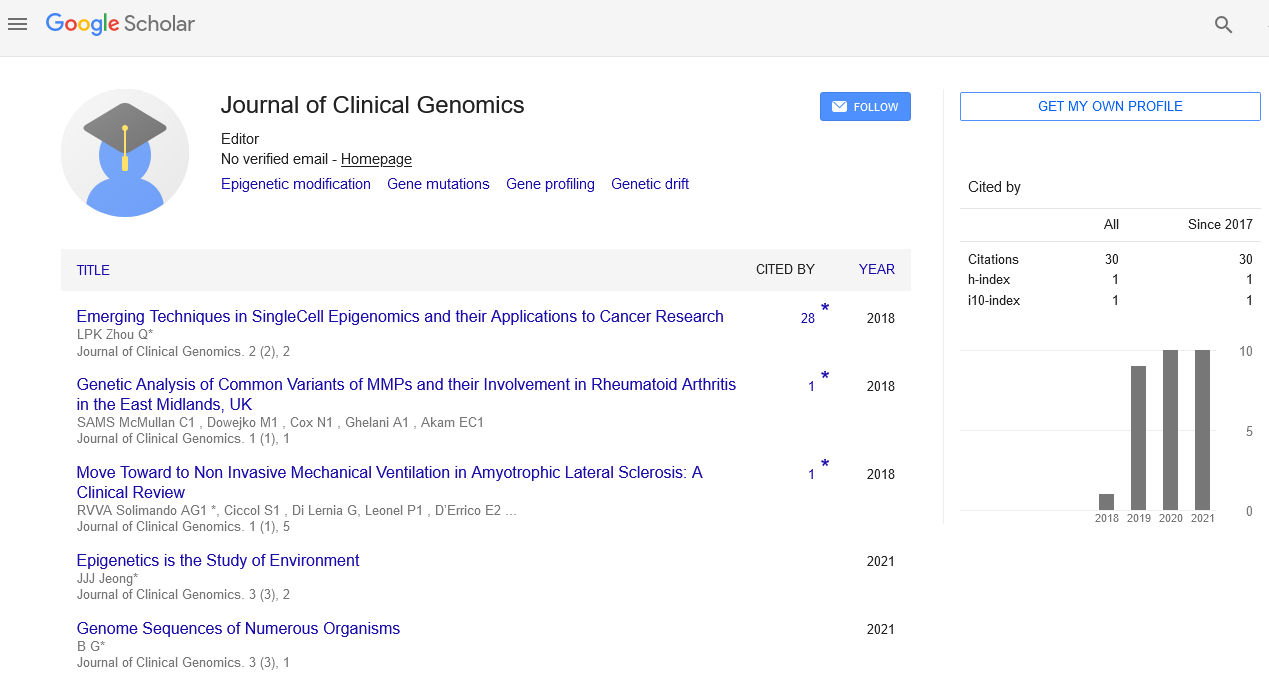Commentary, J Clin Genom Vol: 5 Issue: 4
Analysing the Neurogenetic Disorders, Functions and Mechanisms
Rodinez Willem*
1Department of Neurology, University of Groningen, Groningen, The Netherlands
*Corresponding Author: Rodinez Willem,
Department of Neurology, University of
Groningen, Groningen, The Netherlands
E-mail: rodinez_willem@ug22.nl
Received date: 22 November, 2023, Manuscript No. JCG-24-125703;
Editor assigned date: 24 November, 2023, PreQC No. JCG-24-125703 (PQ);
Reviewed date: 11 December, 2023, QC No. JCG-24-125703;
Revised date: 19 December, 2023, Manuscript No. JCG-24-125703 (R);
Published date: 26 December, 2023, DOI: 110.4172/JCG.1000148
Citation: Willem R (2023) Analysing the Neurogenetic Disorders, Functions and Mechanisms. J Clin Genom 5:4.
Description
The intricate move of the cognitive faculties is orchestrated by the complex interplay of genes and the nervous system. Neurogenetic disorders, arising from variations in the genetic code, provide a unique look into the mysteries of the brain. It embarks to analyze neurogenetic disorders, unravel their impact on brain functions, and explore the underlying mechanisms that shape the neurological landscape. Autism Spectrum Disorders (ASD) represents a spectrum of neurodevelopmental disorders characterized by challenges in social interaction, communication, and repetitive behaviors. Genetic factors play a significant role in ASD, with numerous genes implicated in its etiology. Studying these genetic variations helps uncover the intricate web of interactions contributing to the diverse manifestations of ASD.
Huntington's disease is a hereditary disorder marked by progressive motor dysfunction and cognitive decline. A mutation in the Huntingtin (HTT) gene leads to the production of a toxic form of the huntingtin protein, causing neuronal degeneration. Understanding the mechanisms behind this genetic mutation provides insights into potential therapeutic strategies. Alzheimer's, a neurodegenerative disorder, is influenced by a combination of genetic and environmental factors. Genes such as Apolipoprotein E (APOE) are associated with an increased risk, and unraveling the mechanisms behind these genetic links is essential for developing targeted treatments that may slow or prevent the progression of this devastating disease.
Neurogenetic disorders often impact cognitive functions, including memory, attention, and problem-solving. Studying these disorders illuminates a light on the specific genetic pathways influencing cognitive abilities and contributes to the understanding of how the brain processes information. Variations in genes can influence behavioral patterns, leading to the diverse spectrum of behaviors observed in neurogenetic disorders. By analyzing these genetic basis, analysts gain insights into the molecular mechanisms shaping behavior and emotions.
Neurogenetic disorders can disrupt the intricate network of communication between neurons. Understanding how specific genetic mutations affect neurotransmitter systems and synaptic function is vital for developing interventions that restore normal neuronal communication. Many neurogenetic disorders arise from mutations in specific genes, leading to altered protein expression. Understanding the mechanisms behind these mutations provides valuable information on how aberrant gene expression contributes to the pathology of the disorder.
In disorders like Huntington's disease, genetic mutations result in the misfolding and aggregation of proteins, leading to neuronal toxicity. Investigating the mechanisms behind protein misfolding provides potential targets for therapeutic intervention to prevent or alleviate the progression of these disorders. Epigenetic changes, alterations in gene activity that do not involve changes to the underlying DNA sequence, play a role in neurogenetic disorders. Understanding how epigenetic modifications contribute to the manifestation of these disorders provides new avenues for targeted therapies that may modify gene expression.
Neurogenetic disorders encompass a broad spectrum of conditions, from neurodevelopmental disorders like autism spectrum disorders to neurodegenerative conditions such as Huntington's disease and Alzheimer's. Analyzing these disorders involves unraveling the genetic intricacies that influence the brain's structure, function, and development. Genetic screening is a fundamental tool in the analysis of neurogenetic disorders. It involves examining an individual's DNA to identify specific genetic variations associated with these disorders. Advances in high-throughput sequencing technologies, including Next- Generation Sequencing (NGS), have revolutionized genetic screening, enabling the simultaneous analysis of multiple genes with greater speed and precision.
Whole Exome Sequencing (WES) and Whole Genome Sequencing (WGS) are advanced techniques that analyze the protein-coding regions of the genome (exome) or the entire genome, respectively. These methods provide a comprehensive view of an individual's genetic makeup, allowing for the identification of rare and novel mutations associated with neurogenetic disorders. WES and WGS have proven instrumental in diagnosing complex and genetically heterogeneous conditions.
Conclusion
Analyzing neurogenetic disorders holds immense significance for both understanding the complexities of the human brain and developing effective interventions. As one can unravel the functions and mechanisms underlying these disorders, one can pave the way for targeted therapies, early interventions, and perhaps even preventive strategies. The significance of this studies extends beyond the affected individuals to their families and society at large, providing hope for a future where the understanding of neurogenetic disorders translates into tangible improvements in neurological health and well-being. As one can delve deeper into the brain's code, the potential for possibility of innovative findings and transformative interventions in neurogenetic disorders remains on the horizon.
 Spanish
Spanish  Chinese
Chinese  Russian
Russian  German
German  French
French  Japanese
Japanese  Portuguese
Portuguese  Hindi
Hindi 